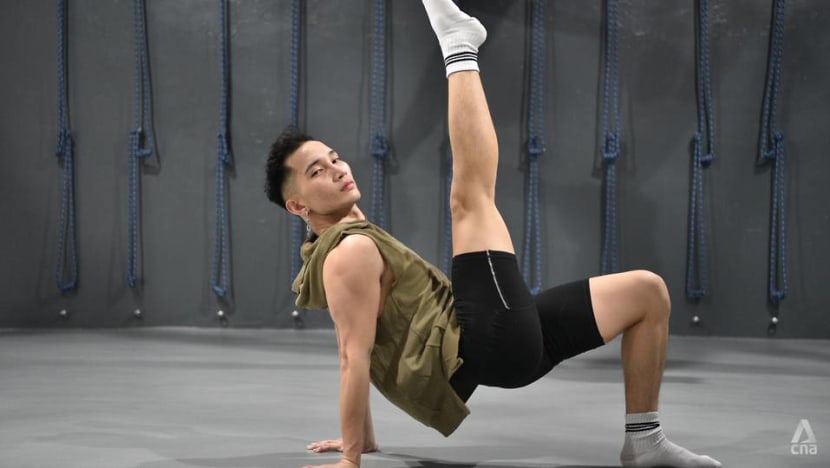Surviving recession: My dance career, mental health suffered. I’m still finding my way back
It’s been an intense period for 30-year-old dancer Syazwan Rahmad — from the impact on his livelihood and new norms for performers, to a big family fight and the emotional toll. He’s one of 12 Singaporeans who shared with CNA Insider how they’ve weathered COVID-19’s economic fallout.

Syazwan Rahmad, 30, is a self-employed dancer, choreographer and instructor.
SINGAPORE: I’d dreamed for three years of auditioning for musicals or choreography positions in Europe. A friend who was in London performed in the Aladdin and Miss Saigon musicals, and I was like, “Oh my God, I need to do that.”
My plan was to fly there for auditions last June — I’d saved up and planned the itinerary, but had not made any bookings.
But the pandemic happened, and this had to be deferred.
EXPLORE THE INTERACTIVE SPECIAL: Surviving recession: How 12 Singaporeans Weathered COVID-19's Economic Fallout
Before COVID-19, I was earning S$5,000 to S$6,000 a month. I was busy choreographing events, music videos, competitions and other productions. I was teaching classes and performing at clubs and private parties.
When the circuit breaker happened, I didn’t care at first; I was going to rest and watch Netflix. A few days later, it hit me — I’m the kind of person who’s very active every day, but suddenly I couldn’t do anything.
WATCH: He lost his income, then sank into depression. An exotic dancer's fight to get back on track (5:47)
Clubs and studios were closed, and classes came to a stop. I had roles in two productions: The Singapore Police Force bicentennial musical, and Vote Kumar by theatre company Dream Academy. Both were cancelled.
In April and May, my monthly income fell to about S$1,000 or less. It was bad.
I went into a dark and negative place. Things went haywire at home because we were in an enclosed space and didn’t get to go out, except to buy food.
I lived with my parents and two brothers in a three-room flat. We quarrelled a lot. I felt I was suffocating.
The lowest point in the circuit breaker happened during the fasting month leading up to Hari Raya on May 24.

A food issue escalated into the biggest argument with my parents, and I suddenly told my father that if he wanted to know another “bad” thing about me, well — I’m gay. He kept quiet, and we didn’t talk about it after that.
Hari Raya is about seeking forgiveness, and it was only a few days later that my mother dragged my younger brothers to me to ask forgiveness. It took me another few days to seek forgiveness from my mum and dad.
Before going back to my room, I also said: “You know, you should listen to your children more too.” But they kept quiet.
Other than that, I kept to myself for about a month, and even thought about committing suicide. I managed to conduct some classes on Zoom, but the stress and depression kept building.
During Phase Two of reopening, when auditions for a major event began, I couldn’t focus and was so embarrassed when the choreographer said, “Wow, Syazwan, what are you doing? Why do you look so lost?”

I’d never been like this in my career, and I left the rehearsal venue. It hurt my reputation.
People reached out to me, but I shut everyone out and later explained to the choreographer that I was going through a bad time and didn’t want to burden the group.
After August, work picked up. I conducted mostly private classes for students, in the studio and on Zoom, and my income recovered to about S$4,000 a month.
I created dance courses for beginners and advanced learners, and promoted them on Instagram.
READ: Despite struggling to draw digital audiences, a dance company persists in the pandemic
READ: ‘If I say I’m poor, there’s someone poorer’: Struggling mum of 4 finds time to help others in pandemic
Enquiries started coming in, and my workload from October was hectic.
In November, my income hit five digits, mostly from teaching. I was amazed because I could previously earn that amount only when I taught, performed and choreographed.

I felt blessed because not many people could earn this much during COVID-19.
November was also the month I moved out of my family home and into a rented room.
I turned 30 on Dec 30, and as my father’s birthday is in early January, the family custom is to celebrate our birthdays together. It was awkward at first because I hadn’t seen my family for a couple of months. I’d only talked to my mother on the phone.
I tried to make conversation, and it got better. They replied and made funny comments, tried to connect with me and asked how I was. They never did that before.
Actually, I miss them a lot.
I talked to my father for the first time in months during the celebration and started to think I could slowly let the past go.

More recently, I sought professional help after another wave of negative thoughts. I told the doctor, can you help me — I’m so tired. I was diagnosed with bipolar disorder last month. I need to focus on myself and heal.
My hope for 2021 is that we can all travel soon, because my dream is still to venture out and audition in London. You only live once, so I will still aim for it.
Read about the 51-year-old who was laid off twice within months and is now helping others like him find jobs.
If you need psychological help, call:
National Care Hotline: 1800-202-6868
Institute of Mental Health helpline: 6389-2222
Samaritans of Singapore: 1800-221-4444
Silver Ribbon Singapore: 6385-3714
Singapore Association for Mental Health: 1800-283-7019
TOUCHline (Counselling): 1800-377-2252



















